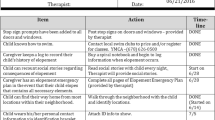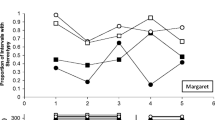Abstract
Interventions based on functional assessments, particularly functional analyses (FAs), are more likely to be effective relative to interventions that are not function-based. However, few clinical investigations have used FAs to assess operant vomiting. This is notable given that operant vomiting represents a medically serious form of problem behavior. To the degree that clinicians can conduct FAs, and use those results to inform function-based treatments for operant vomiting, they can reduce behavior that is associated with considerable medical risk and is also socially conspicuous and stigmatizing. In the current study, we conducted an FA of operant vomiting in a young male with high-functioning autism spectrum disorder. Results suggested operant vomiting was maintained by access to adult attention and escape from academic demands, which is noteworthy given that vomiting is often hypothesized to be maintained by automatic reinforcement. We then implemented a function-based intervention to achieve clinically significant reductions in operant vomiting.

Similar content being viewed by others
Notes
Note that “vomiting” should be distinguished from “operant vomiting” based on the outcomes of function-based assessments (i.e., functional analyses) which evaluate vomiting. To the degree that vomiting is more or less likely to occur as a function of changes to antecedent or consequent events, our confidences increases that this constitutes “operant vomiting”. Within this manuscript, we use “vomiting” and “operant vomiting” interchangeably, though we caution against making determinations regarding the operant nature of vomiting a priori.
Attention and escape test conditions were selected based on a) parent and staff report indicating that vomiting was likely to occur in contexts with demands or low attention, and b) outcomes from FAs for Sam’s other topographies of problem behavior conducted in clinic (c.f., Rooker et al. 2011).
References
Baker, L. M., Rapp, J. T., & Carroll, R. A. (2010). Treating operant vomiting with visual screening. Clinical Case Studies, 9, 218–224. https://doi.org/10.1177/1534650110372253.
Beavers, G. A., Iwata, B. A., & Lerman, D. C. (2013). Thirty years of research on the functional analysis of problem behavior. Journal of Applied Behavior Analysis, 46, 1–21. https://doi.org/10.1002/jaba.30.
Fisher, W. W., Kelley, M. E., & Lomas, J. E. (2003). Visual aids and structured criteria for improving visual inspection and interpretation of single-case designs. Journal of Applied Behavior Analysis, 36, 387–406. https://doi.org/10.1901/jaba.2003.36-387.
Iwata, B. A., Dorsey, M. F., Slifer, K. J., Bauman, K. E., & Richman, G. S. (1982/1994). Toward a functional analysis of self-injury. Journal of Applied Behavior Analysis, 27, 197-209. (reprinted from Analysis and Intervention in Developmental Disabilities, 2, 3–20, 1982). doi:https://doi.org/10.1901/jaba.1994.27-197.
Lang, R., Mulloy, A., Giesbers, S., Pfeiffer, B., Delaune, E., Didden, R., et al. (2011). Behavioral interventions for rumination and operant vomiting in individuals with intellectual disabilities: A systematic review. Research in Developmental Disabilities, 32, 2193–2205. https://doi.org/10.1016/j.ridd.2011.06.011.
Lockwood, K., Maenpaa, M., & Williams, D. E. (1997). Long-term maintenance of a behavioral alternative to surgery for severe vomiting and weight loss. Journal of Behavior Therapy and Experimental Psychiatry, 28, 105–112. https://doi.org/10.1016/S0005-7916(97)00009-8.
Lanovaz, M. J., Huxley, S. C., & Dufour, M. M. (2017). Using the dual-criteria methods to supplement visual inspection: An analysis of nonsimulated data. Journal of Applied Behavior Analysis, 50, 662–667. https://doi.org/10.1002/jaba.394.
Lanovaz, M. J., Turgeon, S., Cardinal, P., & Wheatley, T. L. (2019). Using single-case designs in practical settings: Is within-subject replication always necessary? Perspectives on Behavior Science, 42, 153–162. https://doi.org/10.1007/s40614-018-0138-9.
Nevin, J. A., & Wacker, D. P. (2013). Response strength and persistence. In G. J. Madden (Ed.), APA handbook of behavior analysis (Vol. 2, pp. 109–128). Washington, DC: APA Books.
O'Brien, M. D., Bruce, B. K., & Camilleri, M. (1995). The rumination syndrome: Clinical features rather than manometric diagnosis. Gastroenterology, 108, 1024–1029. https://doi.org/10.1016/0016-5085(95)90199-X.
Rooker, G. W., Iwata, B. A., Harper, J. M., Fahmie, T. A., & Camp, E. M. (2011). False-positive tangible outcomes of functional analyses. Journal of Applied Behavior Analysis, 44, 737–745. https://doi.org/10.1901/jaba.2011.44-737.
Thomason-Sassi, J. L., Iwata, B. A., Neidert, P. L., & Roscoe, E. M. (2011). Response latency as an index of response strength during functional analyses of problem behavior. Journal of Applied Behavior Analysis, 44, 51–67. https://doi.org/10.1901/jaba.2011.44-51.
Vollmer, T. R., Iwata, B. A., Duncan, B. A., & Lerman, D. C. (1993). Extensions of multielement functional analyses using reversal-type designs. Journal of Developmental and Physical Disabilities, 5, 311–325. https://doi.org/10.1007/BF01046388.
Wacker, D. P., Harding, J. W., Berg, W. K., Lee, J. F., Schieltz, K. M., Padilla, Y. C., et al. (2011). An evaluation of persistence of treatment effects during long-term treatment of destructive behavior. Journal of the Experimental Analysis of Behavior, 96, 261–282. https://doi.org/10.1901/jeab.2011.96-261.
Weiss, J. (2002). Self-injurious behaviours in autism: A literature review. Journal on Developmental Disabilities, 9(2), 129–143.
Wunderlich, K. L., Vollmer, T. R., & Zabala, K. A. (2017). Assessment and treatment of automatically reinforced self-induced emesis. Journal of Applied Behavior Analysis, 50, 418–423. https://doi.org/10.1002/jaba.371.
Author information
Authors and Affiliations
Corresponding author
Ethics declarations
Conflict of Interest
On behalf of all authors, the corresponding author states that there is no conflict of interest.
Ethical Approval
All procedures performed in studies involving human participants were in accordance with the ethical standards of the institutional and/or national research committee and with the 1964 Helsinki declaration and its later amendments or comparable ethical standards.
Informed Consent
Informed consent was obtained from the parent of the participant included in the study.
Additional information
Publisher’s Note
Springer Nature remains neutral with regard to jurisdictional claims in published maps and institutional affiliations.
John Michael Falligant is now at the Kennedy Krieger Institute and Johns Hopkins University School of Medicine. Odessa Luna is now at St. Cloud State University.
Rights and permissions
About this article
Cite this article
Falligant, J.M., Pence, S.T., Sullivan, C. et al. Functional Analysis and Treatment of Multiply Maintained Operant Vomiting. J Dev Phys Disabil 33, 153–161 (2021). https://doi.org/10.1007/s10882-020-09740-2
Published:
Issue Date:
DOI: https://doi.org/10.1007/s10882-020-09740-2




